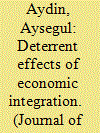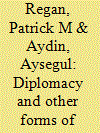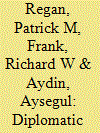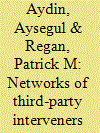| Srl | Item |
| 1 |
ID:
100387


|
|
|
|
|
| Publication |
2010.
|
| Summary/Abstract |
Economic interdependence and international conflict studies have traditionally focused on the role of bilateral trade on direct deterrence, mostly omitting its indirect effects on third-party states. While scholars in the extended deterrence literature have examined the role of defender-target trade in deterring aggressors, most empirical research has remained limited to immediate deterrence and neglected general deterrence. This article synthesizes these literatures and goes beyond the dyad-level analysis in trade-conflict studies by focusing on the deterrent effects of trade. I claim that trade ties between the defender and target are not sufficient for extended general deterrence. This is mainly because international trade by itself is a poor indicator of the extent to which the target is an economically important friend of the defender, worth defending against aggressors. Empirical analysis of militarized disputes between rival states in the post-1945 period supports this point and shows that extended deterrence success is most likely in cases where the defender and target are economically integrated through regional trade institutions as well as conducting heavy trade. Economically minded defenders can successfully generate credible signals of resolve if they have institutional ties with their important trade partners.
|
|
|
|
|
|
|
|
|
|
|
|
|
|
|
|
| 2 |
ID:
073764


|
|
|
|
|
| Publication |
2006.
|
| Summary/Abstract |
Much of the empirical literature suggests that outside interventions tend to lengthen the expected duration of civil wars; conversely, the policy community often acts as if it holds the opposite expectation for the outcome of intervention. The authors argue that the divergence can be found in how models of intervention are specified in the literature. They propose a model with two novel contributions. First, they incorporate mediations as the key to resolving the strategic problems that the civil war parties face. Second, they account for the decaying effect of interventions over time. Their results suggest that diplomacy is critical for understanding the duration of civil conflicts. They find that mediation has a dramatic effect on the expected duration of a civil war and that when controlling for diplomatic efforts, economic interventions can also reduce the expected duration.
|
|
|
|
|
|
|
|
|
|
|
|
|
|
|
|
| 3 |
ID:
085447


|
|
|
|
|
| Publication |
2009.
|
| Summary/Abstract |
Recent research in the civil war literature has focused on how and when external actors intervene. However, to date, systematic data have not existed on diplomatic efforts in conflict management. This article fills this gap and introduces a dataset on 438 diplomatic interventions in 68 conflicts stretching from 1945 to 1999. The authors briefly outline previous research on third-party interventions in civil wars, describe the dataset in some detail, including some initial patterns in the data, and describe how this dataset contributes to research into conflict processes.
|
|
|
|
|
|
|
|
|
|
|
|
|
|
|
|
| 4 |
ID:
181100


|
|
|
|
|
| Summary/Abstract |
Governments may resort to a wide range of economic policies to generate revenue and compensate certain sectors in civil wars. Such measures block market access and hurt the interests of third-party countries operating in this market, giving the latter an incentive to shape the course of events in the conflict. To empirically demonstrate this argument, I look at changes in tariff rates adopted by civil war governments to restrict international trade during conflict. I find strong empirical evidence that external actors consider economic interventions on behalf of the government to meet the demand for revenue and for a return to more liberal policies.
|
|
|
|
|
|
|
|
|
|
|
|
|
|
|
|
| 5 |
ID:
117058


|
|
|
|
|
| Publication |
2012.
|
| Summary/Abstract |
With growing attention to peace-building in civil wars, scholars have increasingly focused on the role that international and regional organizations play in conflict resolution. Less attention has been paid to unilateral interventions undertaken by third-party states without the explicit consent of organizations and to the impact of unilateralism on how long civil wars last. In this article, we claim that unilateral interventions exert a cumulative impact on civil wars depending on interveners' interrelations. States with a cooperative rapport have an easier time in bringing civil wars to an end though they act unilaterally and follow their interests in the civil war environment, whereas states that compete for influence over war combatants prolong the fighting. Analysis results from post-1945 civil wars support our expectations and show that interveners supporting opposing sides of the war increase war duration. On the other hand, third-party states bandwagoning on the same side of a civil war are effective in stopping the fighting only when the intervening parties share similar preferences.
|
|
|
|
|
|
|
|
|
|
|
|
|
|
|
|